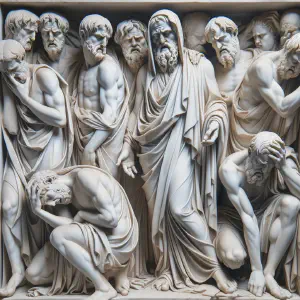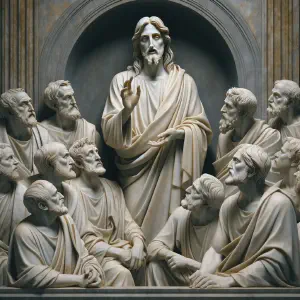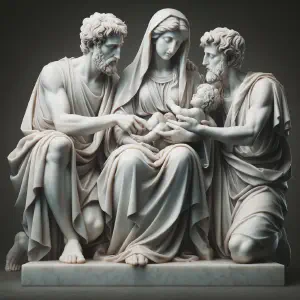The Path of Humility and Truth



Finally, in a profound climax, Jesus spoke to the crowds and his disciples, addressing the hypocritical actions of the scribes and Pharisees. They sat on the chair of Moses, preaching but not practicing, burdening the people without offering aid. Jesus urged his followers to seek a different path – one of humility and service. “The greatest among you must be your servant,” he declared, challenging the norms of society. In his teachings, Jesus dismantled the structures of pride and power, calling everyone to recognize their one true Father in heaven and the one master, the Christ. In his words lay the path to true greatness – through humility and service to others.
Five Questions
What is the significance of the LORD’s rebuke to the priests in Malachi, and how does it relate to today’s spiritual leaders?
The LORD’s rebuke to the priests in Malachi highlights the critical responsibility of spiritual leaders to uphold the truth and integrity of their teachings. It’s a stark reminder that leaders should not lead others astray or show partiality in their decisions. In today’s context, it serves as a caution to all spiritual leaders to remain true to their faith’s principles, avoiding hypocrisy and ensuring their actions reflect the teachings they profess.
How does David’s approach to faith in Psalm 131 provide a model for personal spirituality?
David’s humble approach in Psalm 131, where he likens his soul to a weaned child with its mother, shows a profound trust and peace in God. This approach models personal spirituality as being rooted in humility and simplicity, rather than pride or ambition. It encourages believers to find peace and contentment in their relationship with God, regardless of external circumstances.
In what ways does Paul’s ministry to the Thessalonians differ from the behavior of the priests criticized in Malachi?
Paul’s ministry to the Thessalonians, as described in his letter, is marked by gentleness, self-sacrifice, and a deep personal investment in the community. Unlike the priests in Malachi who were rebuked for leading people astray and being partial, Paul and his companions shared not just the Gospel but their very lives, demonstrating a true shepherd’s care for his flock. This contrast highlights the importance of genuine, selfless service in ministry.
What lessons does Jesus teach in Matthew 23 about leadership and humility?
In Matthew 23, Jesus teaches that true leadership is grounded in service and humility. He criticizes the scribes and Pharisees for their hypocrisy and pride, illustrating that spiritual authority should not be used to burden others or for self-aggrandizement. Instead, Jesus presents a model of leadership where the greatest are those who serve others and where humility leads to exaltation by God.
How do these scriptures collectively address the theme of authenticity in faith?
Collectively, these scriptures address the theme of authenticity in faith by contrasting the behaviors of those who are true to their faith with those who are not. From the false leadership in Malachi to David’s genuine trust in God, Paul’s sincere care for his community, and Jesus’ teachings on humility, each scripture underscores the importance of living a faith that is deeply rooted in truth, humility, and service to others, rather than in outward appearances or self-interest.
Bible Study
Malachi 1:14b-2:2b, 8-10
A great King am I, says the LORD of hosts,
and my name will be feared among the nations.
And now, O priests, this commandment is for you:
If you do not listen,
if you do not lay it to heart,
to give glory to my name, says the LORD of hosts,
I will send a curse upon you
and of your blessing I will make a curse.
You have turned aside from the way,
and have caused many to falter by your instruction;
you have made void the covenant of Levi,
says the LORD of hosts.
I, therefore, have made you contemptible
and base before all the people,
since you do not keep my ways,
but show partiality in your decisions.
Have we not all the one father?
Has not the one God created us?
Why then do we break faith with one another,
violating the covenant of our fathers?
This passage involves a divine rebuke delivered by the prophet Malachi, a messenger of God whose role was to call Israel back to faithful worship. The priests are admonished for failing in their duty to honor God and lead the people rightly, violating the covenant of Levi. This failure is seen as a form of spiritual infidelity, contradicting Catholic values of reverence, obedience to God, and the sanctity of religious office. The passage aligns with the commandment to honor God above all and reflects the catechism’s teachings on the duty of religious leaders to uphold truth and justice.
Psalm 131:1, 2, 3
R. In you, Lord, I have found my peace.
O LORD, my heart is not proud,
nor are my eyes haughty;
I busy not myself with great things,
nor with things too sublime for me.
R. In you, Lord, I have found my peace.
Nay rather, I have stilled and quieted
my soul like a weaned child.
Like a weaned child on its mother’s lap,
so is my soul within me.
R. In you, Lord, I have found my peace.
O Israel, hope in the LORD,
both now and forever.
R. In you, Lord, I have found my peace.
Authored by David, the second king of Israel known for his deep spirituality, this psalm is a profound expression of humility and trust in God. David presents himself in a childlike posture of complete reliance on God, which aligns with the Beatitudes’ call to humility and the Catholic value of trusting in divine providence. This psalm resonates with the catechism’s teachings on the virtue of hope and the inner peace that comes from a deep relationship with God, reflecting the Catholic understanding of grace as a source of spiritual rest.
1 Thessalonians 2:7b-9, 13
Brothers and sisters:
We were gentle among you, as a nursing mother cares for her children.
With such affection for you, we were determined to share with you
not only the gospel of God, but our very selves as well,
so dearly beloved had you become to us.
You recall, brothers and sisters, our toil and drudgery.
Working night and day in order not to burden any of you,
we proclaimed to you the gospel of God.And for this reason we too give thanks to God unceasingly,
that, in receiving the word of God from hearing us,
you received not a human word but, as it truly is, the word of God,
which is now at work in you who believe.
Paul the Apostle, a foundational figure in the early Church known for his missionary journeys and epistles, addresses the Thessalonian community. His approach of gentle nurturing, likened to a nursing mother, aligns with the Catholic ethos of pastoral care and selfless service, reflecting Christ’s command to love one another. Paul’s gratitude for the Thessalonians’ reception of God’s word as truth aligns with the Catholic emphasis on the transformative power of scripture and its role in the believer’s life, resonating with the catechism’s teachings on the efficacy of God’s word.
Matthew 23:1-12
Jesus spoke to the crowds and to his disciples, saying,
“The scribes and the Pharisees
have taken their seat on the chair of Moses.
Therefore, do and observe all things whatsoever they tell you,
but do not follow their example.
For they preach but they do not practice.
They tie up heavy burdens hard to carry
and lay them on people’s shoulders,
but they will not lift a finger to move them.
All their works are performed to be seen.
They widen their phylacteries and lengthen their tassels.
They love places of honor at banquets, seats of honor in synagogues,
greetings in marketplaces, and the salutation ‘Rabbi.’
As for you, do not be called ‘Rabbi.’
You have but one teacher, and you are all brothers.
Call no one on earth your father;
you have but one Father in heaven.
Do not be called ‘Master’;
you have but one master, the Christ.
The greatest among you must be your servant.
Whoever exalts himself will be humbled;
but whoever humbles himself will be exalted.”
This passage features Jesus Christ, the central figure of Christianity, teaching about true leadership and humility. He criticizes the hypocrisy of the scribes and Pharisees, religious leaders of the time, for their lack of authentic practice of faith. This teaching aligns with Catholic values of humility, servant leadership, and the condemnation of hypocrisy. It echoes the catechism’s teachings on the virtues of humility and service, and the necessity of aligning one’s actions with their professed faith, upholding the spirit of the Beatitudes and the call to genuine discipleship.
Lessons
These passages collectively teach the importance of humility, sincerity in faith, and the value of service to others. They warn against the dangers of hypocrisy and pride, especially in spiritual leadership, and emphasize the need for a humble heart in the presence of God. The readings also highlight the peace that comes from trusting in the Lord and the transformative power of receiving and living out the Word of God. In Jesus’ teachings, the call to servant leadership and genuine humility stands as a foundational principle for all believers.
Meditation Prayer


